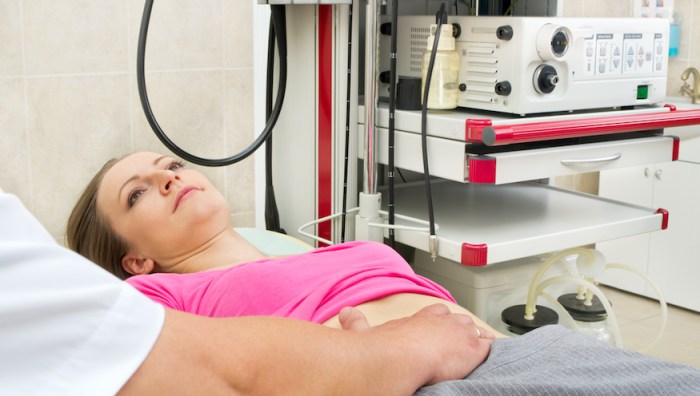Reporter was commissioned to write this in-depth article.
When we talk about HPV (human papillomavirus), cervical cancer typically comes to mind. But what many people don’t know is that the incidence of HPV-related head and neck cancer is on the rise. Recent studies suggest that roughly 70 percent of cancers of the oropharynx might be associated with HPV, according to the CDC.
HPV-related throat cancer: what you need to know

Thinkstock
“Some studies say that people who have five or more sexual partners are at a higher risk of getting HPV-related cancers,” says Dr. ScharukhJalisi, director of Boston Medical Center’s Head and Neck Oncologic Surgery and Skullbase Surgery. “We’re seeing a rise in HPV-related cancers in the throat, and it’s really reaching epidemic proportions.”
While celebrities like Michael Douglas have helped bring awareness to the disease, head and neck cancer still represents a largely under-publicized illness. And, if left untreated, it can be catastrophic.
“People have a narrow window of opportunity to get treatment,” adds Jalisi. “If they miss that opportunity, most of the time the cancer will spread.”
On a more optimistic note, HPV-related throat cancer is associated with higher survival outcomes than non-HPV cases. On the whole, tobacco (whether smoked or chewed) and alcohol use are considered major risk factors for head and neck cancers. These cases are typically linked to more severe outcomes.
According to Jalisi, innovative, less invasive treatment options at Boston MedicalCenter are changing the game.
“The greatest advancement of the last decade has been robotic surgery,” says Jalisi, who’s a renowned robotic surgery expert. “The idea is to remove cancerous tumors through the mouth without having to make any incisions.”
In addition to dramatically speeding up recovery time, robotic surgery also helps to eliminate or reduce the use of radiation. Jalisi says that you only get one chance at radiation therapy in your life, so taking it off the table whenever possible is an exciting option.
Studies are also evaluating “de-escalation” or reduced dose radiation after robotic surgery, and clinical trials are being conducted at Boston Medical Center and around the country.
Robotic surgery aside, patients who require a more aggressive approach are in the best hands at Boston Medical Center. The group’s reconstructive surgeons are some of the most skilled, forward-thinking leaders in the field. Furthermore, those who need radiation therapy can visit Boston Medical Center, where they’ll have access to the latest radiation techniques including intensity modulated radiotherapy, image guided radiotherapy and stereotactic radiosurgery methods. These techniques can be used in head and neck cancer to more precisely target the cancer, while sparing the surrounding normal organs. These methods offer the best chance for a cure while reducing the risk of long-term side effects.
“If someone’s whole jaw needs to be removed, we can make them a new jaw by borrowing a bone from their leg, for example,” Jalisi adds. “Your face is your business card, and we can bring you back to a level of functioning that allows you to return to work and live a normal life.”
While head and neck cancer is indeed serious, it’s also treatable. Dr. Minh-Tam Truong, clinical director of the Department of Radiation Oncology at Boston Medical Center, says that early detection is key.
“What I see in my patient population are usually adults in their 40s to 60s whose cancer is picked up by an oral examination, like during a regular dental exam,” says Truong. “There is no formal routine screening, but if the dentist or patient notices any abnormal lesions in the mouth, ear pain or other irregularities, they should see their doctor.”
Common symptoms of head and neck cancer include ulcers in the mouth, difficulty swallowing, voice changes, persistent nasal congestion, nose bleeds and more. The good news is that acting on these symptoms can put you ahead of the game when it comes to treatment.
“When compared to HPV-negative cases, HPV-positive head and neck cancer in people who are nonsmokers and do not drink alcohol actually has a much more favorable outcome,” says Truong.


















